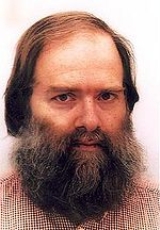
Koenraad Elst
Topics
Koenraad Elst
Quotations

Quotations
Koenraad Elst Belgian writer and author of of over ten books on topics related to Hinduism, Indian history, and Indian politics.
Sourced
- I am neither a Hindu nor a nationalist. And I don’t need to belong to those or to any specific ideological categories in order to use my eyes and ears.
- From an interview with Dr. Ramesh Rao (2002, sulekha.com)
- Conversely, banning this book would send a signal that the present establishment will do what it can to prevent Hinduism from rising up, from regaining self-confidence, from facing the challenge of hostile ideologies.
- Freedom of expression - Secular Theocracy Versus Liberal Democracy (1998, edited by Sita Ram Goel) ISBN 81-85990-55-7
- I have also never participated in any of the meetings of the various embryonic attempts at creating a "Pagan international", whether the Pagan Federation, the World Council of Ethnic Religions or the World Council of the Elders of the Ancient Traditions and Cultures. But I wish them all the best, for they consist mostly of nice people and I can easily see through the attempts by so-called secularists to blacken them and to deny to them the right of international networking which is deemed only natural in the case of Christians or Muslims.
- Hinduism, Environmentalism and the Nazi Bogey -- A preliminary reply to Ms. Meera Nanda
- Indeed, over the years I have had many a good laugh at the pompous moralism and blatant dishonesty of India's so-called secularists. Their specialty is to justify double standards, e.g. why mentioning murdered Kashmiri Pandits is “communal hate-mongering” while the endless litany about murdered Gujarati Muslims is “secular consciousness-raising”. Sometimes they merely stonewall inconvenient information, such as when they tried to deny and suppress the historical data about the forcible replacement of a Rama temple in Ayodhya by a mosque: given the strength of the evidence, all they could do was to drown out any serious debate with screams and swearwords. But often they do bring out their specific talents at sophistry, such as when they argue that a Common Civil Code, a defining element of all secular states, is a Hindu communalist notion, while the preservation of the divinely-revealed Shari’a for the Muslims is secular. That’s when they are at their best.
- Hinduism, Environmentalism and the Nazi Bogey -- A preliminary reply to Ms. Meera Nanda
- "the essence of Hindu Dharma is not ‘tolerance’ or ‘equal respect for all religious’ but satya, truth. The problem with Christianity and Islam is superficially their intolerance and fanaticism. But this intolerance is a consequence of these religions’ untruthfulness. If your belief system is based on delusions, you have to pre-empt rational enquiry into it and shield it from contact with more sustainable thought systems. The fundamental problem with monotheistic religions is not that they are intolerant but that they are untrue (Asatya or Anrita).”"
- Sita Ram Goel: Jesus Christ - An Artifice for Agression (1994)
Ayodhya and After: Issues Before Hindu Society (1991)
- While one should always be vigilant for traces of totalitarianism in any ideology or movement, the obsession with fascism in the anti-Hindu rhetoric of the secularists is not the product of an analysis of the data, but of their own political compulsions.
Who is a Hindu (2001)
- As so often in Indo-Pakistani and Hindu-Muslim comparisons, the argument is reminiscent of the inequality between the contenders in the Cold War: you could demonstrate for disarmament in the West, but to demonstrate for this in the East Bloc (except if it were for unilateral disarmament by the Western “war-mongers”) would have put you in trouble.
- The neologism âdivâsî constitutes one of the most successful disinformation campaigns in modern history.
- In the West, secularism implies pinpricking religious fraud and arrogance, but in India, secularists are the most eloquent defenders of myth and theocracy.
Ayodhya: The Case Against the Temple (2002)
- Future historians will include the no-temple argument of the 1990s as a remarkable case study in their surveys of academic fraud and politicized scholarship.
Silverdale Interactive © 2026. All Rights Reserved.

